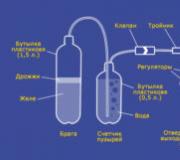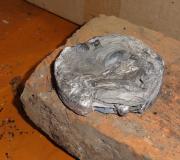How long can a gasoline generator run. Time of continuous operation of generators
At present, in industry, in construction or in everyday life, electric generator sets are widely used. various types, power and purpose. In cases where the power plant acts as a permanent or backup power source, the user is interested in increasing the duration of its continuous operation. In the case when the generator is used only sporadically, this requirement is not so relevant.
In order to understand how long the operation of the power plant will not have negative impact on her technical condition and will not cause the need for repair, you should, first of all, study the features of the main types of this equipment.
Gasoline generators
Structurally, a gasoline generator can have an engine with an aluminum or cast iron cylinder block. The first are distinguished by a small motor resource (several hundred hours). For engines with a cast iron block, the installation life can be compared with the characteristics of a small diesel generator, and it can already reach up to 3-5 thousand hours. It is worth emphasizing the efficiency of such generators and not high level noise that they reproduce during operation. Most of the time, these settings do not have own system cooling, which does not allow their use in continuous mode. After a few hours of work petrol plant needs a break to let her motor cool down. Also, do not forget about the high cost of fuel used by installations. of this type. But if needed alternative source energy - inexpensive, compact and lightweight, the choice is obvious. Especially if the generator is not planned to be used often and for a long time.
Gasoline models traditionally have low power (2-15 kW), are compact and economical, but are designed for short-term operation (7-8 hours). Such units have a low time between failures (up to 4000 hours) and most often act as emergency power sources. Petrol generators can be used at home, on a construction site, on a film set, in nature, etc.
Diesel plants
Diesel generators can be equipped with high-speed or low-speed engines. Most often, such stations have their own, provided by design, liquid cooling system. High-speed units are more affordable in terms of pricing policy, but they have a number of disadvantages similar to those of gasoline generators. This is a relatively small motor resource, and, in addition, such installations emit more noise during operation. And such a generator can work without stopping for no more than two days. The expediency of using such a station is available if the operating mode is planned to be no more than 600 hours per year. If the generator will work in a more intensive mode, it is better to pay attention to more expensive, but reliable low-speed installations. The advantage of low-speed diesel generators is in small operating costs. The use of such installations gives an economic effect during long-term operation. Moreover, they can work without stopping for an extremely long time.
Diesel generators are produced in a wide range of capacities (12-300 kW), have a reliable design, a relatively high motor resource, are safe in operation and can operate continuously for more than 10 hours. These modifications are usually used as permanent and backup power supplies. Diesel generators are designed for use in critical industrial, construction and domestic facilities.
More precise data regarding the permissible duration of work without interruption for specific model can be provided by the generator manufacturer. Modern Russian and foreign manufacturers take into account the interests of users and constantly improve the designs of power plants produced. At the same time, when choosing a unit, it is necessary to take into account not only the maximum duration of its operation, but also other characteristics, as well as real operating conditions and user needs.

Currently, in industry, in construction or in everyday life, power generators of various types, capacities and purposes are widely used. In cases where the power plant acts as a permanent or backup power source, the user is interested in increasing the duration of its continuous operation.
All questions regarding the selection, installation, operation of low-power power plants are answered by Energomodul specialists.
Is a manual or electric starter preferred for a 6kW small power plant?
It is problematic for a sports unprepared person to start a 6 kW power plant using a manual starter (rope). We recommend buying power plants equipped with an electric starter (ignition key) for a power of more than 5 kW.
I have a small welding machine at 220V, it works from a regular outlet, which gasoline generator should I choose for it?
The household socket has following characteristics: 16A, 250V is 4 kW. But we must remember that the welding machine has a starting current, so it is better to purchase a gas generator with a power reserve, we recommend 5-6 kW.
How long can my gasoline generator run without stopping?
Low-power (up to 15 kW) gasoline and diesel generators operate at 3000 rpm and not designed for permanent work. All low-power power plants are divided into three groups:
- Group I - household portable power plants, the annual operating time should not exceed 250 hours per year;
- Group II - semi-professional power plants, annual operating time should not exceed 500 hours per year;
- Group III - professional power plants, annual operating time of more than 1000 hours per year is possible.
To clarify which group your gasoline generator falls into, you need to contact the seller.
Can a gasoline generator run outdoors? I have seen such installations in operation many times in parks near shops and stalls.
The gas generator can operate outdoors in good weather and even in the rain, as electrical part has a degree of protection of the shell IP23.
The first digit 2 is protection against foreign objects having a diameter >12.5 mm.
The second number 3 is protection against liquid penetration (protection against rain when water flows vertically or at an angle up to 60° to the vertical).
Still, in heavy rain, you should not leave the gas generator. Remember that you are dealing with electricity. And most importantly, the power plant must be grounded before starting.
I purchased a 4 kW gas generator in a large store on the Moscow Ring Road. I need to mount it in the country and install an autorun system on it in case of power failure. The store refused to help me. Advise what to do?
If your gasoline generator is equipped with an electric starter (started by turning the key, from the battery), then autostart can be set on it, but if the generator is started by a manual starter, then autostart cannot be set. In any case, the specialists of our company will help to install your gas generator in the country.
I want to buy a 10 kW gasoline power plant, but I am embarrassed by the small fuel tanks installed on them, only for 5-6 hours of continuous operation. Can I put an extra container of fuel nearby?
Absolutely not! The installation of additional containers for flammable liquids with a flash point below 61 degrees Celsius, the so-called flammable liquids, is prohibited. You can recommend installing a diesel power plant, and already put a fuel tank up to 5000 liters to it.
In the cottage I installed a gasoline power plant with a capacity of 8 kW, but I rarely use it, once every 3-4 months. And when it is required - I can not run it, because. the battery runs out, you have to pull the manual starter, and this is very difficult. Advise what to do?
To prevent battery discharge (battery), we can install an automatic charger, it will keep the battery charge constant.
What difficulties can arise when installing a low-power power plant? Will I be able to mount the gas generator myself, in a specially built room?
There are no difficulties, it is necessary to create three systems - electrical, exhaust and ventilation. You can if you are a welder, ventilator and electrician.
I need a low power 6 kW power plant. I can not decide, advise on the choice: buy a gasoline or diesel power plant? What is the difference?
Each type of power plant has its pros and cons, everyone chooses gasoline or diesel engine according to your requirements, we can only compare, and you make a decision. So:
gasoline generators compared to diesel generators: cheaper, lighter, less noisy, easier to start from a manual starter, work well at low temperatures, but have higher fuel consumption, fuel is more expensive, engines have less motor life * 2-3 times .
* - engine life, the operating time of any machine with an internal combustion engine or the internal combustion engine itself to the limit state at which their further operation is generally impossible or is associated with an unacceptable decrease in efficiency and violations of safety requirements.
Off-grid generators are often indispensable, and full list their possible applications will be very long - from providing electricity beach party on weekends to permanent work at a private building. A wide range of work performed has generated a large number of types of autonomous generators that differ both in design and characteristics. What they have in common is the principle of operation - an internal combustion engine of one type or another rotates the shaft of an electric generator, converting mechanical energy into electrical energy.
- A domestic generator is usually a portable gasoline-powered unit, not intended for continuous operation, with a power of several kVA.
- Professional generators have increased power and time of continuous operation, and for greater fuel efficiency and an increase in the resource, engines are usually installed on them. At the same time, if household electric generators generate a current of 220 V, then professional generators are overwhelmingly designed for 380 V output voltage. Large dimensions and weight force either to place powerful generators on a wheeled chassis, or to make them stationary.
So, in this classification, we have already found a series design differences. Let's consider them in order.
 As you know, a gasoline engine can work like. At the same time, low efficiency and a limited resource make two-stroke engines not the most the best choice to drive an electric generator, although they are simpler in design, which means they are cheaper and lighter.
As you know, a gasoline engine can work like. At the same time, low efficiency and a limited resource make two-stroke engines not the most the best choice to drive an electric generator, although they are simpler in design, which means they are cheaper and lighter.
A four-stroke engine, although it harder and more expensive consumes much less fuel and able to do much more. Therefore, generators up to 10 kVA are usually equipped with engines of this type.
Gasoline engines of electric generators are mainly single-cylinder units with forced air cooling, the preparation of a combustible mixture is carried out using a carburetor. To start them, either a rope starter is used, or an electric start is additionally included in the design (then, in addition to the battery, such generators also have a 12 V output: the battery is charged from this circuit and consumers designed for low-voltage power can also be connected to it). The most common motors with a cast-iron sleeve and an overhead valve gas distribution mechanism are, as a rule, GX motors and their copies.
Domestic gasoline generator engines not intended for long-term continuous operation. Exceeding the operating time specified in the operating instructions (usually no more than 5-7 hours) will reduce the life of the motor.However, even the most advanced gasoline engines have a limited resource: with proper care, they will work 3-4 thousand hours. Is it a lot or a little? With occasional use on the road, for example, to connect a power tool, this is a fairly large resource, but constantly powering a private house from a gas generator means to sort out its engine every year.
Much have more resources power units, in addition, they are more profitable during long-term operation due to greater efficiency. For this reason, all powerful generator sets, both portable and stationary, use diesel engines.
For such units, a number of disadvantages of diesel engines compared to gasoline ones (high cost, greater weight and noise) are not fundamental, there is a certain inconvenience only when starting diesel engines in cold weather.
During operation, please note that long work on Idling without load is harmful to them: completeness of fuel combustion is disturbed, which leads to increased soot formation, which clogs the exhaust, and dilution of engine oil by diesel fuel seeping through the piston rings. Therefore, the list of routine maintenance for diesel power plants necessarily includes their periodic output to full capacity.In addition, there are generators that work. Structurally, they are no different from gasoline, except for the power system: instead of a carburetor, they are equipped with a gas pressure regulator and a calibrated nozzle that supplies gas to the intake manifold. At the same time, such generators can use not only a cylinder with liquefied gas, but also the gas network - in this case, fuel costs become minimal. The disadvantage of such generators is low mobility ( gas bottle larger and heavier than a gas tank, which, moreover, can be refueled on the spot), as well as an increased fire hazard, especially with illiterate operation. However, as a backup power source in a house connected to a gas main, this is a good option: there is no need to take care of maintaining the level and quality of fuel in the gas tank, and the engine life when running on gas is higher than when running on gasoline.
The generator, like any technique, although it does not have a soul and reason, for some reason "sensitively" responds to the owner's attitude towards it. Probably, you have repeatedly heard stories about how “I just bought a generator, worked for two hours and that's it! It doesn’t start at all! ”(c). In the vast majority of cases, the protection against oil starvation simply worked and the generator does not start precisely because of the low oil level. Let's look at how you generally need to serve, and simply use generator.
Gasoline generators from KotelTorg:You bought a generator.
So, you have purchased the generator, removed it from the packaging and inspected it for any damage that may have occurred during transportation. Pay attention to the fact that all pipelines are connected to the appropriate nozzles.
To begin with, it is extremely necessary to read the instructions that are attached to your generator, and only after that start operating the equipment.
After reading the instructions, it is necessary to pour a sufficient amount of engine oil into, do not spare money for high-quality oil, not such a large amount is required, we recommend synthetic engine oils(e.g. CASTROL Magnatec 5W-40). In any case, when using oil, consider the temperature environment where the generator will be used.
The next step is filling the fuel tank with fuel. USE ONLY UNLEADED and quality gasoline. Particular attention must be paid to the cleanliness of the gasoline, since canisters are mainly used as intermediate containers for gasoline. It is necessary to be sure that water and / or foreign substances and dirt do not get into the gasoline. The use of fuel additives with methanol (various octane-boosting additives based on alcohols) is strictly unacceptable. The octane number of gasoline must be at least 87, that is, it is 92 gasoline. We do not recommend using 95 petrol.
Before starting work, the generator must be installed on a flat, dry surface. If the generator is not equipped with an exhaust system, the generator can only be started outdoors. A prerequisite safe work is the generator ground. This is your safety, do not neglect it. next step preparation is an external inspection of the equipment, check all connections and the correctness of the selected power cables.
Be sure to turn off all consumers that you plan to connect to the generator, and only after that you can start the engine.
Please note that the equipment must be inspected before each start-up and after 8 hours of continuous operation of the equipment.
Launch.
· Open the rotary fuel cock.
· Pull the throttle lever towards you.
· If the engine is equipped with an electric start, press and hold the Start/On/Off key until the engine starts. If the engine is started using the manual start (Recoil Starting System), you need to move the button to the Start position and pull the starting handle sharply towards you.
· Be sure to let the engine run for a few minutes. Gradually return the throttle lever to its original position.
· Only then can consumers be connected.
Stop generator.
Turn off all current consumers connected to the generator
· Disconnect and disconnect the generator load.
· The engine needs to run for a few minutes without load.
· Move and hold the Start/On/Off key until the engine stops completely.
· Be sure to close the rotary fuel cock.
Engine break-in
The generators we sell are extremely reliable equipment. But, how you will operate your generator depends on how long it will serve you. Proper running-in of the internal combustion engine of the generator is the basis for a long and trouble-free operation.
Despite the fact that it would seem logical not to load the generator during the break-in, we strongly recommend that you give at least a fifty percent load for the first one and a half to two hours of the generator break-in. It is impossible that the generator would work for a long time with a minimum load or no load at all. Note that you will need to check the oil level every time you fill up with fuel. And it is even better to do this during the break-in every 4 hours. Oil (on a hot engine) is changed after 20 hours of operation. After that, the run-in can be considered completed.
Regular operation
If you are not using the generator all the time, we recommend that you run the set at 50% capacity every month for a minimum of 2 hours. Periodic starts do not allow moisture to condense inside the engine and generator, restore the oil film in the internal combustion engine and significantly reduce oxidation in electrical contacts.
IMPORTANT! It is better for a generator to run for 2 hours non-stop than 10 times for 12 minutes.
If you are using a generator high temperature environment, please Special attention on Free access fresh air(the engine is AIR-cooled, do not forget this). Regularly clean the fins of the engine cooling jacket with a dry cloth. At low temperatures, the correct gap of the spark plug electrode is especially important. In both cases, the correct viscosity oil will be an important point.
If the generator set is operated in high altitude conditions, please note that the engine power, and consequently the generator power, will decrease by 4% every 310 meters above sea level. Those. at an altitude of 1500 meters, a 5.5 kW generator can actually produce no more than 4.3 kW. This is especially important for those who buy "magic suitcases" for 1 kW. And they try to use them in the mountains.
To be continued.
Number of impressions: 40507
Today, generators are used everywhere, not only in the field of industry or construction, but also in the domestic sector. These units can be used as a backup or permanent source power supply. And the most important question for buyers is how long such a unit can provide electricity to connected loads, as well as how to extend this period without harming the generator itself or the equipment connected to it. But first you need to find out what features stand out different types electrical power generation devices.
gasoline generator
Equipped with engines with cast iron or aluminum cylinders. The first ones are especially popular, as they are able to provide an engine life of 3-5 thousand hours. The second ones are more affordable, but their reserve of operation is only a few hundred hours. advantage gasoline engine is the economy of fuel and oil consumption, also reduced level noise and environmental friendliness. These advantages are especially relevant, since gasoline has a higher cost, and they are used without protective cover, in close proximity to the dwelling or the operator who conducts repair work by connecting tools to the generator.
Gasoline power generation devices, as a rule, are used as a backup power source, as well as during field trips and during various works V field conditions. Inexpensive, light and compact, they become ideal option for occasional use. But for regular launch as the main source of electricity, and even for long periods of operation, such generators are not very profitable. Models of gas generators, basically, have a power consumption in the range of 2-15 kW, which is considered low and medium. The duration of continuous work is also low: from 2 to 15 hours. To increase the period of continuous operation, you can use a reduced power consumption, although this figure is not uniform. That is, with a rated power of 6 kW, using actually only 3 kW, it is possible to increase the duration of the generator by just a couple of hours. To increase the overall operating capacity of the generator, high-quality care is necessary, correct installation and connection. It will reduce wear mechanical parts devices.
Diesel generators
Diesel generators are equipped with low-speed and high-speed drives. Most often, the design provides for a liquid cooling system, which allows the unit to be used for a long time. An important difference between diesel generators is the increased cost, but on the other hand, they can have a larger power reserve, as well as the applied diesel fuel significantly cheaper than gasoline. High-speed generators are cheaper, but they have all the disadvantages that are presented in gasoline models. First of all, this is a reduced motor resource. At the same time, diesel units emit a high level of noise, and they are also less environmentally friendly. The period of continuous operation of such units cannot exceed two days, which is significantly higher compared to gasoline units, but less than low-speed units. It is profitable to buy these stations when calculating the operation of no more than 600 hours in one year. Low-speed generators are expensive, but they withstand the maximum high loads and can be used for intensive use. The engines of such installations are more economical in terms of fuel consumption, and the period of continuous operation is very long. Accordingly, these generators are very convenient for industrial and construction sites, suitable for providing electricity as the main source of hospital, car service or large office. All diesel generators are produced in a fairly wide range of power consumption. You can purchase compact 12 kW models or bulky, but super-productive 300 kW models. Robust construction, simplicity and safety in operation make this species power plants are very popular.




